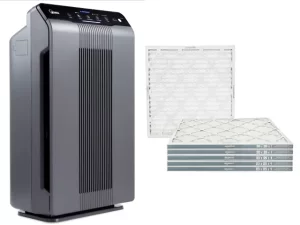Air Purifier vs Air Filter (The Difference)
You may be asking, what is the difference between an air purifier and an air filter, or maybe wondering which to purchase for your home?
In this article, we’ve stated some differences between air purifiers and air filters, and how they both function to help you make a better decision during purchase.
Without further ado, let’s begin!

What is an Air Purifier and does it work
Air purifiers are used to neutralize the effect of indoor pollutants at home and in the office. They are very effective against dust mites, pollen, mold spores, and bad odors.
Air purifiers deliver quality air free of pollutants from the air in your home. They help neutralize the effect of harmful air pollutants which an air filter cannot remove.
This device works by drawing the pollutants in and trapping them and then rendering them ineffective. They can’t have any more health challenges and they use UV lights or fans depending on the type of air purifier you have.
Here is how a typical air purifier work
Step 1: The air purifier absorbs the pollutants
Step 2: The air passes through the purification process depending on the type of purifier
Step 3: All pollutants are rendered ineffective and trapped
Step 4: The purified air is blown back into the air in the room
What is an Air Filter and How it works
Air filters are built-in devices for HVAC systems that filter the air that comes into the system before releasing it into the air again.
They trap large air particles from getting into your central heating or cleaning systems like HVAC to avoid the buildup of dirt and debris which can damage the device and pollute the air you breathe in at home.
Air filters work like Sievers, when air passes through them, they trap the particles and allow only the filtered air to come out. This means only clean air is flowing in your home.
This is how an air filter work;
Step 1: The air is drawn to the air filter and pushed into the system
Step 2: Filtration happens when air passes through the air duct. Particles that are larger than the holes in the filter won’t be able to pass through it and are trapped.
Step 3: The air is filtered and the clean air is released into the air, and then the cycle starts again.
This way pollutants are fully removed from your home. Some filters use HEPA filters, which are very effective and known to capture tiny particles as small as 0.3 microns.
Difference Between Air Purifiers and Air Filter
People use the term air purifier and filters interchangeably but they are quite different in their mode of work. Though both work to help you breathe in good air at home.
Here are some of the differences between air purifiers and air filters:
Mode of getting rid of pollutants
One difference between an air filter and an air purifier is how they get rid of air pollutants. Air purifiers remove pollutants and dirt from the air by using UV lights, fans, or HEPA filters.
Depending on the type of air purifier you have, it absorbs the pollutants and renders them unharmful before releasing clean air back into the room.
While air filters prevent the passage of particles that are harmful from passing and getting into your central HVAC system, air conditioning, or purification system.
Noise
Air filters are usually combined with central HVAC systems for more effective filtration of air particles and this could cause noise pollution.
Air filters produce a lot of noise, which can be disturbing during usage. But, an air purifier produces less noise when compared with an air filter.
Fan-based air purifier produces noise but is lesser when compared to air filters, because other types of air purifiers produce less noise
Kinds of pollutants they can remove
Air filters are effective in removing and trapping large particles from passing through their filters, but are less effective against bacteria, viruses, chemicals, bad odors, or smoke that may be present in the air of your home.
Air purifiers are effective in removing bacteria, viruses, chemicals, bad odors, or smoke that may be present in the air of your home. Air purifiers are ineffective in removing dust, but an air filter is effective.
Air filters can remove particles like dirt and pet dander from the air, while air purifiers can remove Volatile Organic Compounds (VOC) from your home. If you want to remove every source of allergens at home then an air purifier is the perfect choice for you.
Maintenance
Air filters are expensive to purchase and maintain. Unlike air purifiers, regular washing may not be required, but changing the filters is necessary at least once every six (6) months.
Constant replacement of the filters is needed as molds and dust may buildup, which would pollute the air it was supposed to filter and this could be expensive to do.
Air purifiers are less expensive to purchase and maintain. Regular washing and cleaning will help get rid of molds and bacteria that may build up to cause odors and air pollution.
Air purifiers, depending on the type you have, may not require filter change, making them more cost-effective than air filters that require filter change.
Conclusion
Air purifiers and air filters are often used interchangeably. Most often, people argue they are the same with no clear difference between the two.
However, this article has shed light on the differences between air purifiers and filters and we hope it answers your question on the difference between both devices and helps you make a better choice during purchase.
For better air quality at home, air purifiers are combined with air filters to get rid of pollutants that are harmful to one’s health.
